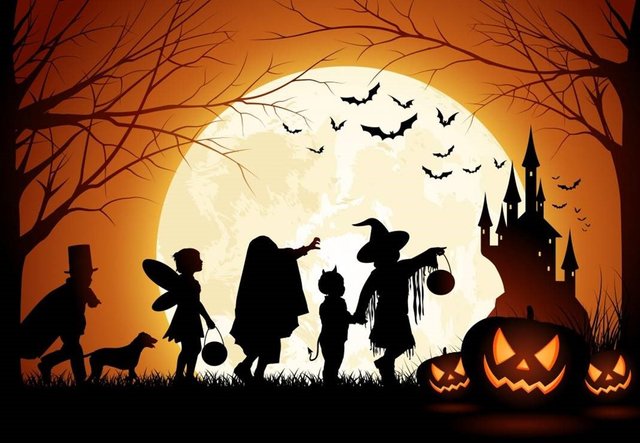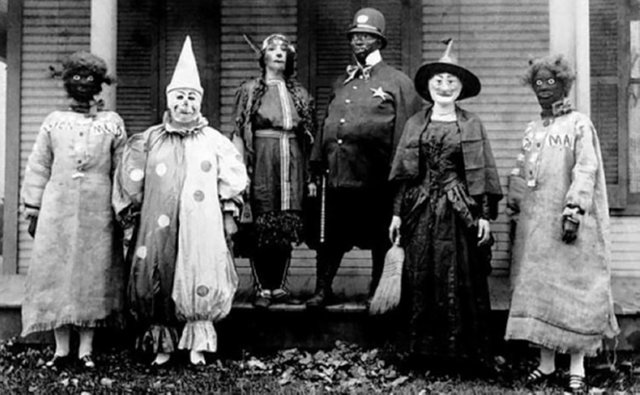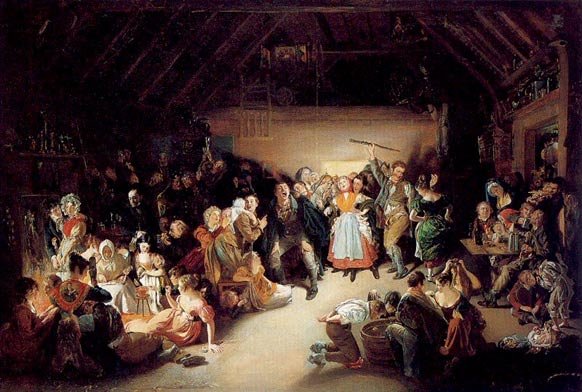The Origin of Halloween
Hello fellow steemians!! it's been three days since i've last posted an article here. Although, i've starting writing the following article three days ago, but i couldn't post it because i have been very busy shifting my home to a new apartment. As you can see in the title, it's about the origin of the Halloween and i wanted to post it while the festivity was still warm. However, i'm glad that i'm being able to post it after all - and i hope that you'll enjoy it. Here it goes:

This 31st October, the whole world, especially the people of the USA,Canada, and Europe has celebrated the Halloween festival with lots of creepy and cute costumes along with trick or treat game, and a lot of candies. However, while many have celebrated this holiday, some of them may have celebrated it without knowing its origin and history. So, I thought why don’t I share what I know about the origin of this holiday – and therefore I started to write this article.
Contrary to some popular opinion, the origin of Halloween has little to do with the United States.
It was about 2000 years ago that the Celtic people of France and the British Isles began with the tradition of Halloween.
For those people, the last day of October was celebrated as the holiday of Samhain, as it was regarded as the last day of summer and the beginning of the Celtic New Year.
This commemoration also celebrated other aspects of society at that time, such as the end of the last harvest of the year, the beginning of winter food storage, the return of herds of pasture, and the period of renewal of its laws. This holiday was also known as La Samon and as Feast of the Sun. Curiously the name that has survived until today was the name used by the Scots, that is, Hallowe'en.

The main Celtic legend associated with this festival reported that on this day all the spirits of the people who had died during that year would come back for living bodies to possess them and thus, live throughout the following year.
This belief was based on the fact that the Celtic people believed in all the laws of space and time, so they thought it was permissible for the worlds of the living and the dead to mingle with each other, because, for them, it was considered the only form of life after death.
But, of course, the living did not want to be possessed by the spirits of the dead, and so when the night of October 31 came, they would extinguish the torches and the fires of their houses so that they would become cold and uncomfortable and wear costumes to then paraded noisily through the streets, being as destructive as possible, with the sole aim of frightening the spirits who sought bodies to possess. According to some, this was the reason that people started to wear masks and weird costumes to pose as non human creatures so that the spirits won’t recognize them as humans and won’t posses them.

The Roman people came to adopt this Celtic practice, but about a century after Christ they eventually abandoned it.
The designation of "Halloween" was born in the United States, when in 1840 the customs of Halloween were taken there by the Irish emigrants.
The funny "trick or treat" game was adapted from a European custom of the 9th century, called "souling" (craving). Christians had the habit of walking on the streets during the religious holiday of November 2, known as All Souls Day or Soul Day, asking for "soul cakes", which were nothing more than that small squares of bread with blackcurrant. And for every soul cake offered, the person receiving it prayed a prayer for a dead relative of the donor. And why would you do this? Because it was believed that with this practice the souls that still remained in limbo were helped to go to heaven.

One of the other habits of Halloween and probably its biggest symbol today is the pumpkin with a candle burning inside. It is believed that this image originated in Irish folklore and the Jack-O'-Lantern story, although the original story uses turnips and not pumpkins.
There is also no Halloween without reference to witches. His relationship with them is very strong. Legend has it that the witches had two annual festive meetings: the first on 30 April and the second on 31 October.
They arrived at the party place on flying brooms, turned into other beings and cast spells and curses on people. All these caused a great uproar.
It was common to believe that anyone wishing to have contact with a witch should wear their clothes inside out and walk on their backs during Halloween night. If s/he did, a witch would appear when the midnight would come.

A painting of an Irish Halloween party (1832) by Daniel Maclise - source
Nowadays it is the children and adolescents who enjoy Halloween the most. With the help of parents and friends, they wear more or less frightening costumes and walk door to door in the neighborhood to exclaim the celebrated phrase "trick or treat." And there they finish the night of October 31st with sacks and baskets filled with chocolates, sweets and other goodies. If you ask me, i think it's better this way.
If you’ve enjoyed my content, please let me know through Upvote and Comment.
For more informative and entertaining contents about history, art, and mystery-
Follow me here : @tamurah
Keep Living---keep Loving---Keep steeming
Have a nice day

courtesy: wikipedia || ancient-origins.net || historystuff.net
I kinda actually knew of this you know. Halloween wasn't a festival that was celebrated by religious individuals even by some christian factions. Furthermore, now all has been revealed, we are now actually celebrating a ritual that allows demons to possess human beings, quite stupid if you ask me.
so, instead of escaping them, people are welcoming them........... funny how things change - and, it's stupid indeed :D